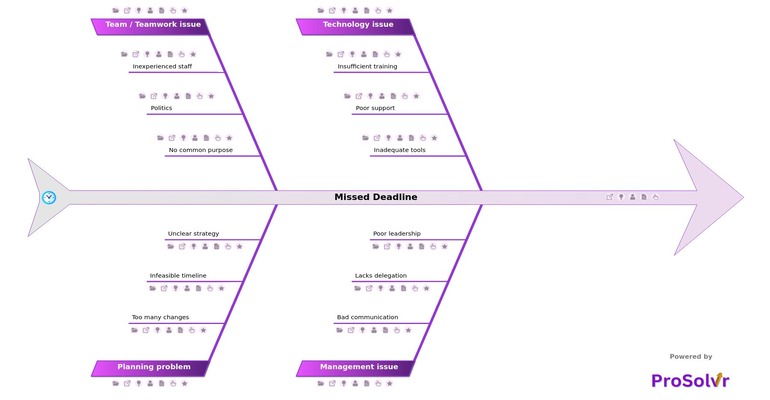Root Cause Analysis of Missed Deadline
In the fast-paced world, missed deadlines can be detrimental to success, causing frustration and setbacks. Conducting a thorough Root Cause Analysis (RCA) is essential to identify the underlying factors contributing to missed deadlines. By pinpointing these issues, teams can implement effective strategies to prevent future delays and enhance project efficiency.
Technology issues often lurk beneath the surface, hindering progress and causing delays. Insufficient training in new technologies or tools can lead to inefficiencies, while poor support structures may leave teams stranded when problems arise. Additionally, inadequate tools can impede workflow and slow down processes, making it crucial to assess and address any technological shortcomings that may be impacting deadlines.
Management plays a pivotal role in deadline management, and issues within this realm can significantly impact project timelines. Poor communication among team members or between management layers can lead to misunderstandings and delays in decision-making. Furthermore, a lack of delegation or micromanagement can bottleneck workflow, stifling productivity. Effective leadership is paramount in guiding teams towards success, motivating members, and fostering a conducive working environment.
Team dynamics and collaboration are vital components of project success, but they can also be sources of missed deadlines if not managed effectively. Inexperienced staff members may require additional support and guidance, while internal politics can create unnecessary roadblocks. Moreover, a lack of a common purpose or shared vision can result in conflicting priorities and divergent efforts, leading to project delays. Addressing these teamwork issues through clear communication and fostering a collaborative culture can mitigate risks and streamline project execution.
In conclusion, missed deadlines can be attributed to a variety of factors, ranging from technological shortcomings to management issues and teamwork dynamics. Conducting a comprehensive Root Cause Analysis (RCA) is imperative to unearth these hidden culprits and implement targeted solutions. By addressing the root causes of missed deadlines, teams can enhance their project management practices, improve productivity, and ultimately achieve success in their endeavors.
Who should use the Missed Deadline template?
The Missed Deadline template is beneficial for any individual or team involved in project management across various industries. It can be particularly useful for:
- Project Managers: Project managers can utilize the Missed Deadline template to conduct thorough Root Cause Analyses (RCAs) when deadlines are not met. It helps them identify underlying issues within their projects and implement corrective actions to improve future performance.
- Team Leaders: Team leaders responsible for overseeing specific tasks or departments within a project can use this template to investigate missed deadlines within their areas of responsibility. It allows them to identify weaknesses in processes, communication, or team dynamics and implement solutions to enhance efficiency.
- Business Owners and Executives: Business owners and executives can benefit from the insights provided by the Missed Deadline template to understand the factors contributing to project delays. By addressing these issues, they can optimize resource allocation, mitigate risks, and improve overall project outcomes.
- Quality Assurance Professionals: Quality assurance professionals can employ this template as part of their continuous improvement efforts. By analyzing missed deadlines and identifying root causes, they can develop strategies to enhance project management practices and ensure timely delivery of high-quality results.
- Project Teams: Members of project teams can collaborate on using the Missed Deadline template to collectively assess project performance and identify areas for improvement. It fosters a culture of accountability, transparency, and continuous learning within the team.
Overall, the Missed Deadline template is a versatile tool that can be used by individuals and teams at various levels of the organization to enhance project management practices and achieve better outcomes.
Why use the Missed Deadline template?
Using the Missed Deadline template offers several advantages for project management and improvement efforts:
- Identifying Root Causes: The template guides users through a systematic analysis of missed deadlines, helping to uncover the underlying factors contributing to delays. By identifying root causes, teams can address fundamental issues rather than merely treating symptoms, leading to more effective and lasting solutions.
- Improving Decision-Making: By understanding why deadlines are missed, project managers and team leaders can make more informed decisions about resource allocation, scheduling, and project planning. This insight enables them to prioritize actions that will have the most significant impact on meeting future deadlines.
- Enhancing Communication: The process of using the Missed Deadline template encourages open communication and collaboration among team members. By involving stakeholders in the analysis, teams can gain diverse perspectives and insights, leading to a deeper understanding of the challenges faced and potential solutions.
- Driving Continuous Improvement: By regularly using the template to analyze missed deadlines, teams can establish a culture of continuous improvement within the organization. Each analysis provides opportunities to learn from past mistakes, implement changes, and refine processes, ultimately leading to higher efficiency and better project outcomes.
- Mitigating Risks: Through a structured analysis of missed deadlines, teams can proactively identify and mitigate risks that could impact future project timelines. By addressing issues before they escalate, teams can minimize the likelihood of future delays and disruptions, enhancing project stability and success.
Overall, the Missed Deadline template serves as a valuable tool for project management by facilitating thorough analysis, promoting collaboration, and driving continuous improvement. By leveraging this template, organizations can enhance their ability to meet deadlines, deliver projects successfully, and ultimately achieve their strategic objectives.








